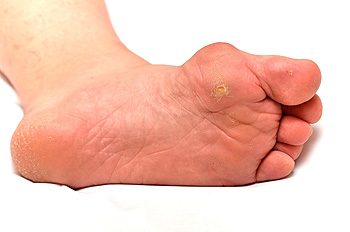The Difference Between Corns and Calluses
Monday, 15 April 2019 00:00 Corns and calluses are both forms of hardened skin that appear on the foot, but they are not the same condition. Neither condition is dangerous, but both can cause discomfort or irritation. Corns and calluses usually develop as a reaction to pressure or friction. Standing for long periods of time, sweating, and wearing ill-fitting shoes make one more prone to developing corns or calluses. Calluses and corns vary in where they are likely to appear and their shape. Calluses usually appear on the soles of the feet, while corns often occur on the non-weight bearing parts of the skin. Calluses can vary in shape, while corns are normally small, round, and defined. Corns are also more likely to be more painful than calluses. If you are experiencing pain with either corns or calluses, consult with a podiatrist about the best treatment option for you.
Corns and calluses are both forms of hardened skin that appear on the foot, but they are not the same condition. Neither condition is dangerous, but both can cause discomfort or irritation. Corns and calluses usually develop as a reaction to pressure or friction. Standing for long periods of time, sweating, and wearing ill-fitting shoes make one more prone to developing corns or calluses. Calluses and corns vary in where they are likely to appear and their shape. Calluses usually appear on the soles of the feet, while corns often occur on the non-weight bearing parts of the skin. Calluses can vary in shape, while corns are normally small, round, and defined. Corns are also more likely to be more painful than calluses. If you are experiencing pain with either corns or calluses, consult with a podiatrist about the best treatment option for you.
Corns can make walking very painful and should be treated immediately. If you have questions regarding your feet and ankles, contact Dr. Frederick Quirante of Texas. Our doctor will treat your foot and ankle needs.
Corns: What Are They? And How Do You Get Rid of Them?
Corns are thickened areas on the skin that can become painful. They are caused by excessive pressure and friction on the skin. Corns press into the deeper layers of the skin and are usually round in shape.
Ways to Prevent Corns
There are many ways to get rid of painful corns such as:
- Wearing properly fitting shoes that have been measured by a professional
- Wearing shoes that are not sharply pointed or have high heels
- Wearing only shoes that offer support
Treating Corns
Although most corns slowly disappear when the friction or pressure stops, this isn’t always the case. Consult with your podiatrist to determine the best treatment option for your case of corns.
If you have any questions please feel free to contact our office located in Nederland, TX. We offer the newest diagnostic and treatment technologies for all your foot and ankle needs.
Read more about Everything You Need to Know About Corns





